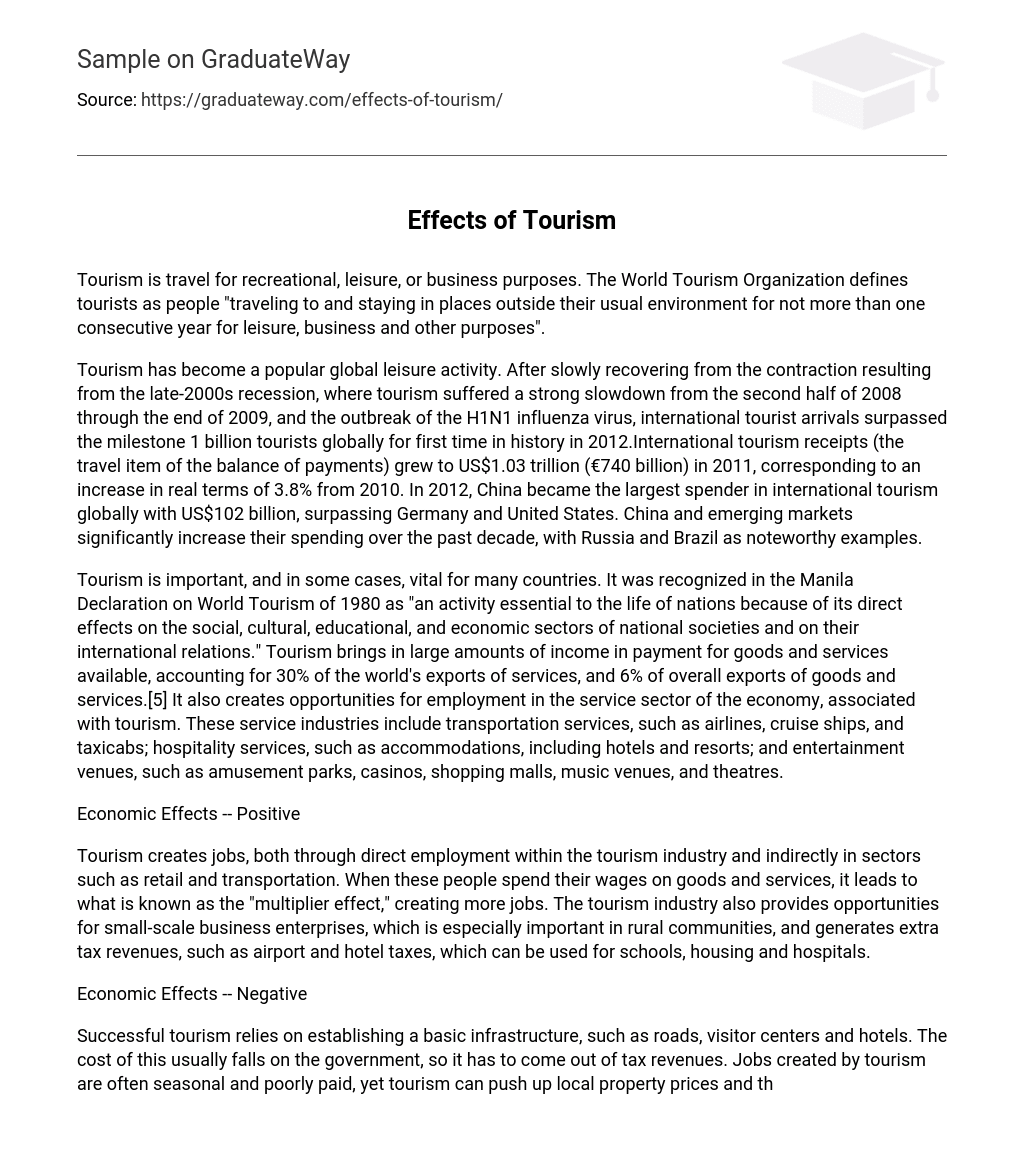Tourism is travel for recreational, leisure, or business purposes. The World Tourism Organization defines tourists as people “traveling to and staying in places outside their usual environment for not more than one consecutive year for leisure, business and other purposes”.
Tourism has become a popular global leisure activity. After slowly recovering from the contraction resulting from the late-2000s recession, where tourism suffered a strong slowdown from the second half of 2008 through the end of 2009, and the outbreak of the H1N1 influenza virus, international tourist arrivals surpassed the milestone 1 billion tourists globally for first time in history in 2012.International tourism receipts (the travel item of the balance of payments) grew to US$1.03 trillion (€740 billion) in 2011, corresponding to an increase in real terms of 3.8% from 2010. In 2012, China became the largest spender in international tourism globally with US$102 billion, surpassing Germany and United States. China and emerging markets significantly increase their spending over the past decade, with Russia and Brazil as noteworthy examples.
Tourism is important, and in some cases, vital for many countries. It was recognized in the Manila Declaration on World Tourism of 1980 as “an activity essential to the life of nations because of its direct effects on the social, cultural, educational, and economic sectors of national societies and on their international relations.” Tourism brings in large amounts of income in payment for goods and services available, accounting for 30% of the world’s exports of services, and 6% of overall exports of goods and services.[5] It also creates opportunities for employment in the service sector of the economy, associated with tourism. These service industries include transportation services, such as airlines, cruise ships, and taxicabs; hospitality services, such as accommodations, including hotels and resorts; and entertainment venues, such as amusement parks, casinos, shopping malls, music venues, and theatres.
Economic Effects — Positive
Tourism creates jobs, both through direct employment within the tourism industry and indirectly in sectors such as retail and transportation. When these people spend their wages on goods and services, it leads to what is known as the “multiplier effect,” creating more jobs. The tourism industry also provides opportunities for small-scale business enterprises, which is especially important in rural communities, and generates extra tax revenues, such as airport and hotel taxes, which can be used for schools, housing and hospitals.
Economic Effects — Negative
Successful tourism relies on establishing a basic infrastructure, such as roads, visitor centers and hotels. The cost of this usually falls on the government, so it has to come out of tax revenues. Jobs created by tourism are often seasonal and poorly paid, yet tourism can push up local property prices and the cost of goods and services. Money generated by tourism does not always benefit the local community, as some of it leaks out to huge international companies, such as hotel chains. Destinations dependent on tourism can be adversely affected by events such as terrorism, natural disasters and economic recession.
Social Effects — Positive
The improvements to infrastructure and new leisure amenities that result from tourism also benefit the local community. Tourism encourages the preservation of traditional customs, handicrafts and festivals that might otherwise have been allowed to wane, and it creates civic pride. Interchanges between hosts and guests create a better cultural understanding and can also help raise global awareness of issues such as poverty and human rights abuses.
Social Effects — Negative
Visitor behavior can have a detrimental effect on the quality of life of the host community. For example, crowding and congestion, drugs and alcohol problems, prostitution and increased crime levels can occur. Tourism can even infringe on human rights, with locals being displaced from their land to make way for new hotels or barred from beaches. Interaction with tourists can also lead to an erosion of traditional cultures and values.
Environmental Effects — Positive
Tourism — particularly nature and ecotourism — helps promote conservation of wildlife and natural resources such as rain forests, as these are now regarded as tourism assets. It also helps generate funding for maintaining animal preserves and marine parks through entrance charges and guide fees. By creating alternative sources of employment, tourism reduces problems such as over-fishing and deforestation in developing nations.
Environmental Effects — Negative
Tourism poses a threat to a region’s natural and cultural resources, such as water supply, beaches, coral reefs and heritage sites, through overuse. It also causes increased pollution through traffic emissions, littering, increased sewage production and noise.
You can find information about this on: http://traveltips.usatoday.com/positive-negative-effects-tourism-63336.html





